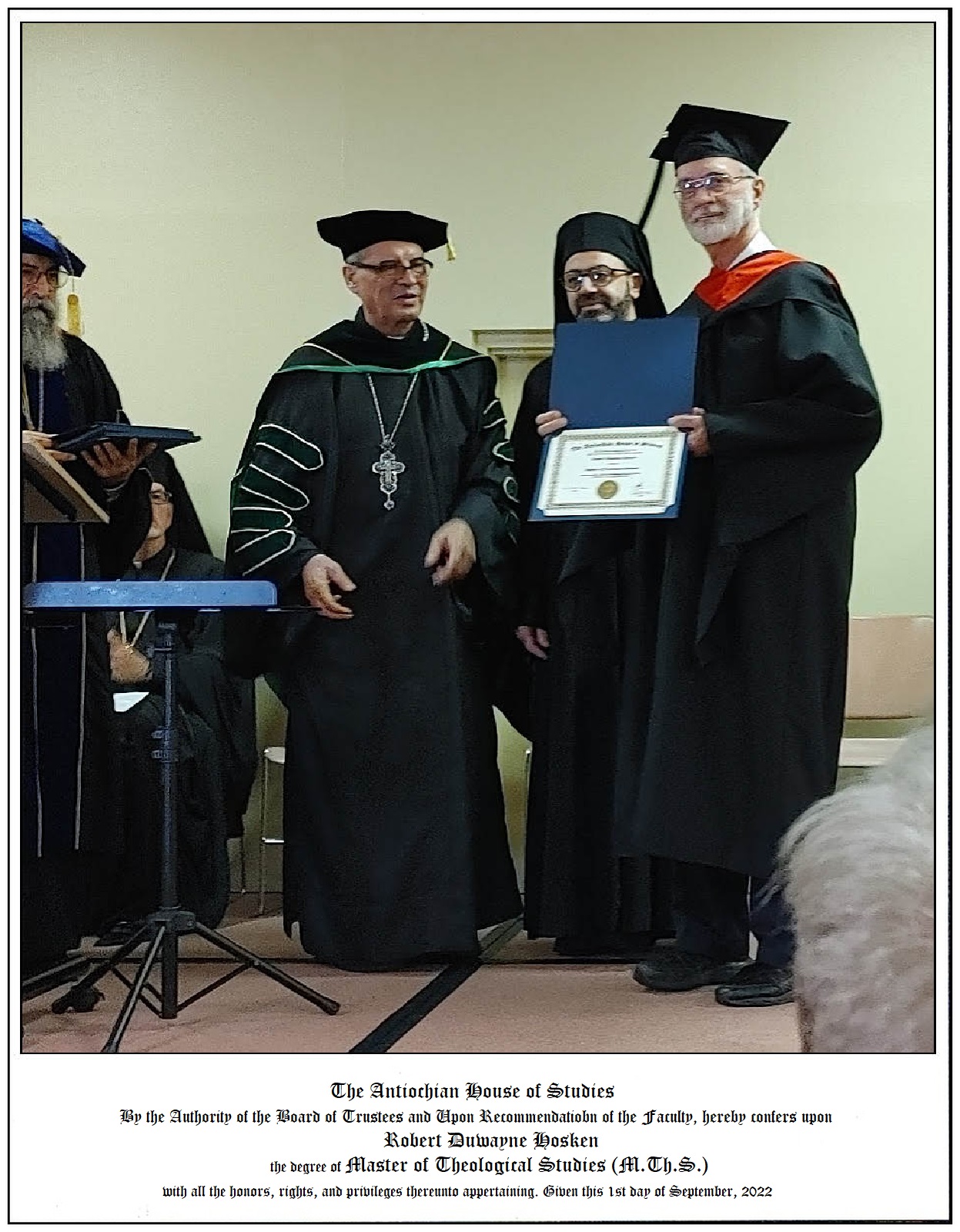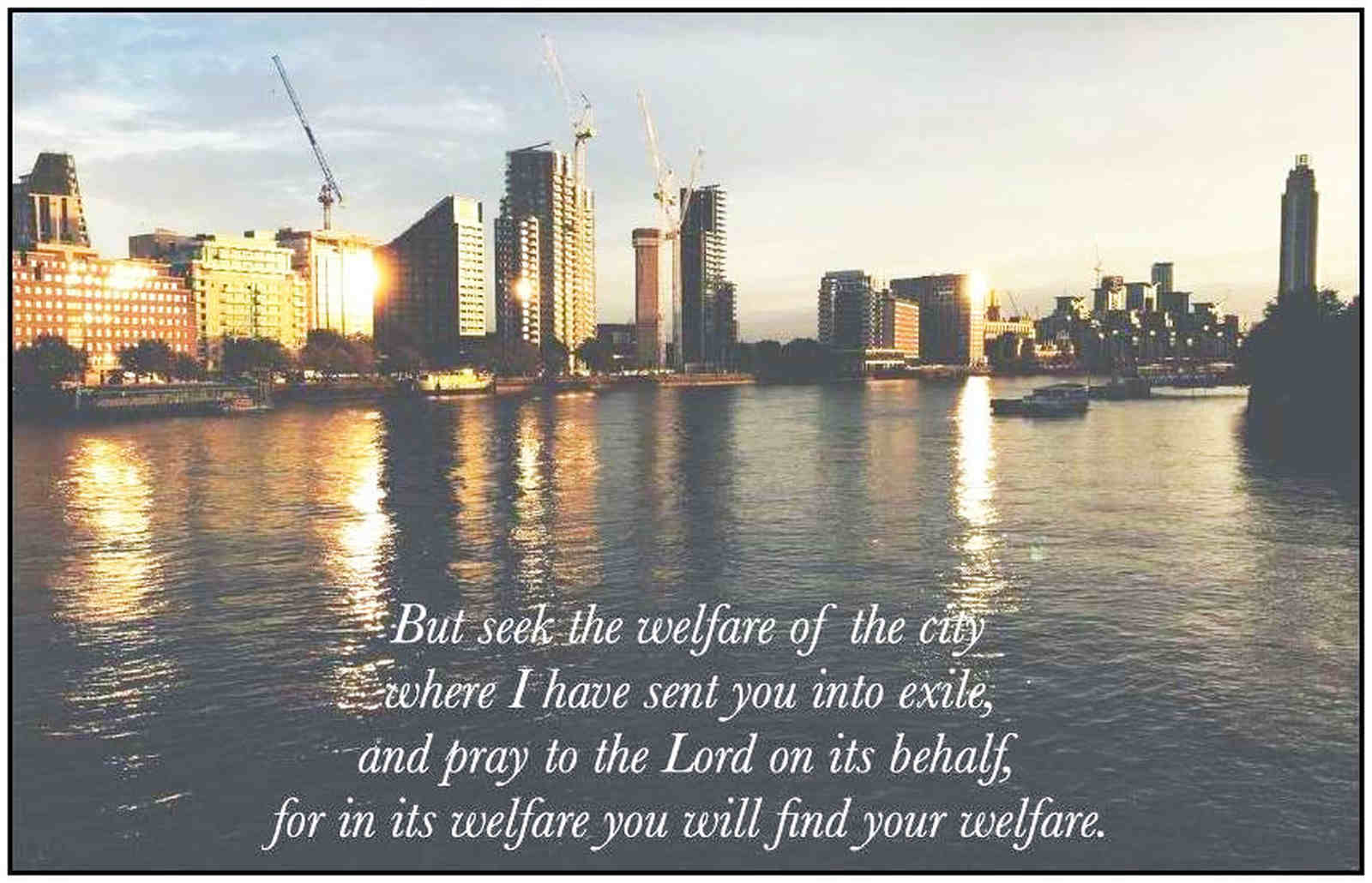 Where does the concept of "philanthropy" come from? Where did we get the idea of erecting hospitals, orphanages, homes for the elderly and infirm? Today we might think that these institutions were created by billionaires who made their money off railroads, steel mills or the stock market, or perhaps the government dreamed them up. But the historical fact is that these institutions for the public well-being were created during the one-thousand-year-long Byzantine Christian Empire. Only later did these ideas take root in Western Europe, and from there to the rest of the world.
Where does the concept of "philanthropy" come from? Where did we get the idea of erecting hospitals, orphanages, homes for the elderly and infirm? Today we might think that these institutions were created by billionaires who made their money off railroads, steel mills or the stock market, or perhaps the government dreamed them up. But the historical fact is that these institutions for the public well-being were created during the one-thousand-year-long Byzantine Christian Empire. Only later did these ideas take root in Western Europe, and from there to the rest of the world.
When the people of Israel were carried away into Babylonian captivity because they had forsaken the Lord, many of them thought they should form their own closed cultural group to preserve their ethnic identity, having as little to do as possible with Babylon. But the prophet Jeremiah told them - "Seek the welfare of the city where I have caused you to be carried away captive, and pray to the Lord for it; for in its welfare you shall have welfare.... For I know the thoughts that I think toward you, says the Lord, thoughts of peace, and not of evil, to give you hope for your future. You shall call on me, and you shall go and pray to me, and I will listen to you. You shall seek me, and find me, when you shall search for me with all your heart. I will be found of you, says the Lord, and I will return you from captivity". (Jer. 29:7, 11-14)
Thus the idea of seeking the welfare or well-being of society at large seeped from the Jewish nation to surrounding nations such as Babylon, Greece and Rome, but those nations limited such social programs to "their own kind," not sharing their wealth with other tribes and peoples. It took Christ's Great Commission to "Go into all the world and make disciples of all nations" before this idea of sharing one's well-being with others – even one's enemies – could take root.
For the first three hundred years Christians were "in captivity" of frequent persecutions, but still reached out in love to those around them. Why? Because Christ Himself was and is the great Philanthropos, the "Lover of Mankind." This divine love for mankind enables us to perform genuine philanthropy:
"The philanthropy of man is theologically grounded in the philanthropy of God. Although God is completely unknown in His nature, He becomes known through His revelation to mankind and in history as philanthropic and merciful. The philanthropy of God is apparent, among other signs, in the nature of man, in his destiny, and in his place in creation. Only man is created 'according to the image and likeness of God' (Gen. 1:26). Only he exists as a person who comes into communion with God. Only man has as his destiny an eternal progress, through a process of inner purification and sanctification, towards the attainment of the divine likeness." (Miltiadis Vantsos and Marina Kiroudi, "An Orthodox View of Philanthropy and Church Diaconia," Christian Bioethics, 13:251–268, 2007, Taylor & Francis Group, LLC, p. 253)
According to the Romanian scholar Cristian Petcu, "...the main social welfare institutions of the Early Church were the Brephotropia (nurseries for foundlings), Parthenocomia (shelters for spinsters), Gerocomia (homes for widows), and Orphanotropia (orphanage). The Orphanotropia was an outstanding achievement of the Early Church in the field of social welfare, which manifested Christian love of one’s neighbour. As early as the fourth and fifth centuries, the Church founded special establishments for orphans (both Christian and non-Christian), whose care was entrusted to the clergy under the guidance of a bishop, as attested by the archive documents. The earliest orphanage seems to have been the St. Zoticus Orphanage, from the time of Constantine the Great, Roman Emperor between 306 and 337, famous for his edict granting tolerance of the Christian faith. In the fourth century, St Sava, in chapter 48 of his Typikon, expressly lays out the duties of the abbot:
'It is fitting that the abbot should take care of healing the sick, be they those who dwell in the monastery, be they those who seek him out (…) Then let the abbot examine the patient and restore his health, and if he pay him no heed, then he is in great danger. And let it be binding upon him.'
"These rules for monasteries, which had an organised framework, were a practical extension of the situation that had existed during the time of the Church’s persecution. Given that they were unable to organise themselves within a well-defined framework, the Christians of the first three centuries ended up in the strange situation of endangering their lives in order to help the sick. Thus, Ss. Cosma and Damian, St. Pantelimon, St Ermolaos, Ss. Cyrus and John, and St. Thalasius are known as wonderworking unmercenaries, great healers of the sick. The work of these martyrs was continued after the period of persecution by private persons, outstanding among whom was St. Melanie the Roman, whose donations to the poor and asylums are reckoned to have been enormous."
"By the fourth and fifth centuries we find a corps of Christians who tended to the sick in particular. These Parabolani were recruited from among the poor and humble and were skilled in caring for the sick and also had medical knowledge. It was the bishops who appointed the Parabolani. From the extant sources it appears that in the Early Church the Parabolani were a corps of Christians ready to sacrifice themselves for their neighbour and serve the common good, and were permanently exposed to the danger of being infected by those they treated.
"Every religious society engaged in social and charitable work as a means of consolidating and spreading Christianity in the ancient world. Thus, in the beginning, the residualist model was dominant in the beginning as short-term assistance, through the founding of orphanages, asylums, hospitals, and so on. But this kind of traditional charity work could not cope with the difficulties of the needy during times of war or in the post-war period in particular.
"In order to be materially and psychically independent and in order to make best use of his own resources, a person must attain a certain degree of maturity and have a developed personality and faculty of judgment. In Christianity, there is also the advantage of divine intervention. In fact, the development of the personality means the path towards likeness with God, the replacement of the old man with the new, who dwells in Christ. The role of social work is to make the recipient aware of the need to change and to assist him in the process of solving the problem." (Cristian Petcu, "Historical and Canonical Reflections on the Church’s Philanthropic Work," International Journal of Orthodox Theology 4:4 (2013) urn:nbn:de:0276-2013-4069, pp. 116-119)
Here we clearly see the goal of the social ministry of the Church: "The role of social work is to make the recipient aware of the need to change" – unless the poor or disabled person makes a commitment to change, our efforts to help may be in vain. In his oration "Who is the Rich Man that Will Be Saved?", Clement of Alexandria explained that when Christ told the rich young ruler to sell all that he owned and give to the poor, "Christ is not asking the young man to literally dispense with his possessions, but rather to become a free person by breaking his attachment to them, since the person who is concerned about acquiring or keeping wealth is not truly free. As Clement says, 'Christ does not, as some conceive off-hand, bid him throw away the substance he possessed, and abandon his property; but rather bids him banish from his soul his notions about wealth, his excitement and morbid feeling about it, the anxieties, which are the thorns of existence, which choke the seed of life.'" The attitude of the heart must change, both for the rich man and the poor man. Greed must be expelled.
Saint Basil of Caesarea, however, took the words of Christ to the rich young ruler quite literally. Basil was a wealthy young man who became a monk and later bishop of Caesarea. He donated all his wealth to the poor by constructing the "New City" just outside Caesarea. He devised a new approach for monastics: both monks and nuns should serve God by serving mankind. Basil's Basiliad or "New City" had a hospital, lodging for pilgrims, and housing for the poor and elderly along with the monasteries. Doctors and nurses were brought in to minister to the sick. "Basil explicitly rejects any attempt to formulate a two-tiered approach to the commandment. In Basil’s view, 'sell your possessions and give to the poor' is an expression of the law of love, and is therefore equally applicable to all, both monastics and non-monastics." (Paul Schroeder, "Building the New City: St. Basil’s Social Vision," http://incommunion.org/2008/12/07/building-the-new-city-st-basils-social-vision/)
Saint John Chrysostom, while he was Patriarch in the late fourth century, also had homes for the poor and hospitals built in Constantinople. Another man, "less well known than Basil and Chrysostom, was the fifth-century patriarch Attikos. Under his leadership, the Church of the capital extended its philanthropic programs to the poor of other ecclesiastical jurisdictions. The Church historian Socrates relates that Attikos “was so liberal that he not only provided for the poor of his own parishes, but transmitted contributions to supply the needs and promote the comfort of the indigent in the neighboring cities also.” On one occasion he sent to Kalliopios, a presbyter of the church in Nicaea, three hundred pieces of gold (nomismata) in order to assist him in his work among the poor.
"The following letter is an interesting source of information about the poor in Nicaea and the Church’s response to poverty. Attikos wrote to Kalliopios:
"I have been informed that there are in your city ten thousand needy persons whose condition demands the compassion of the pious. And I say ten thousand, designating their multitude rather than using the number precisely. Since I have received a sum of money from God who with a bountiful hand is eager to supply faithful stewards, take, my friend, these three hundred pieces of gold and dispose of them as you may think fit. It will be your care, I doubt not, to distribute to those who are ashamed to beg, and not to those who through life have sought to feed themselves at the expenses of others. In bestowing these alms make no distinction on religious grounds, but feed the hungry whether they agree with us in sentiment, or not.
"As the example of Attikos indicates, Churchmen were careful not to support professional beggars and those who refused to work. A second example is the deaconess Olympias, a very generous woman but also careless in her generosity. John Chrysostom wrote a letter advising her to use more discrimination in her contributions:
"I applaud your intentions; but would have you know that those who aspire to the perfection of virtue according to God, ought to distribute their wealth with economy…. You ought, therefore, to regard your wealth as belonging to your Master, and to remember that you have to account for its distribution. If you will be persuaded by me, you will in the future regulate your donations according to the wants of those who solicit relief. You will thus be enabled to extend the sphere of your benevolence."
(Demetrios Constantelos, "ORIGINS OF CHRISTIAN ORTHODOX DIAKONIA: CHRISTIAN ORTHODOX PHILANTHROPY IN CHURCH HISTORY," http://connection.ebscohost.com/c/speeches/55575785/origins-christian-orthodox-diakonia-christian-orthodox-philanthropy-church-history, pp. 17-18.)
Under the heading "The Hospital as Symbol of the Church" we learn that the Church should see herself as a hospital for both the sick and for sinners. By the eighth century, the great Christian Emperor Justinian rebuilt the Xenodochion, or hospital, of Sampson, located between the Hagia Sophia cathedral and the Church of Saint Irene, which had been functioning for some time, but had been burned down in the Nika revolt. "Justinian rebuilt it on a grander scale and endowed it with an annual income so that it could extend its range of services to the sick of the capital. From this time onward Byzantine hospitals began to function proactively as centers where doctors assembled together professionally to practice healing arts on sick who were brought to the hospital. It proved to be a major stimulus to the medical capacity and skill of the profession. In Byzantine hospitals, unlike many of their medieval western counterparts, the treatment of the inmate was undertaken with concerted action.
"As his own foundation, and that of Theodora [his wife, a former prostitute who had been rescued and converted to Christianity – ed.] Justinian also established the two Xenones, hospices, of The House of Isidore, and the House of Arcadios. It is recorded that he also constructed large hospitals at Antioch and at Jerusalem. In the latter case, he responded favorably to the petition of the ascetic St. Saba, which the pilgrimages to Jerusalem left many arriving visitors sick and exhausted and in need of special care. In this instance we know that Justinian supervised the building of a centre that contained two hundred beds and was endowed with an imperial gift of annual income of 1850 gold solidi for its maintenance (a very large sum of money)." (John McGuckin, "Embodying the New Society: The Byzantine Christian Instinct of Philanthropy," http://academiccommons.columbia.edu/catalog/ac%3A138606, p. 65)
The hospital of Sampson continued functioning up to the fall of Byzantium in the early 1400s. Thus we see just a few of the great philanthropic institutions of the thousand-year Byzantine Empire. It is not enough for us to have good intentions when practicing Christian charity: we must also be careful to ensure that those who are physically and mentally able make the efforts needed to be restored to wholeness.
(Also download this essay in PDF format at https://agape-biblia.org/literatura/#welfare, and get several more free e-books and booklets on "Creating Christian Community.")
Click on the "Share" buttons above TO SHARE THIS ↑ ESSAY with your friends, and click on Contact to WRITE YOUR COMMENTS.
Also, enroll in our free courses to see how YOU can do diakonia-ministry:
My wife and I left our careers 30 years ago to serve in Russia as missionaries:d we're now nearing 80 and semi-retired. We receive no financial support from Agape Restoration Society, we volunteer our time. Our websites and ministry are funded by just a few friends and myself. So if just 5% of the people on our mailing list would give just $5 per month, we could cover our operating expenses and do much more in serving and providing accessible housing for the disabled. See below: ↓ ...thanks in advance!
Keep our websites free! Support Agape Restoration Society via PayPal: click the "DONATE" button.
Also, please Share Our Vision with your family & friends.
And bookmark our Amazon Smile link to shop at Amazon!
NEXT, THE NEWS:
THE IDEA THAT PREGNANCY IS 'SLAVERY' AND 'SERVITUDE' IS NOT BASED IN REALITY
from: LiveAction News
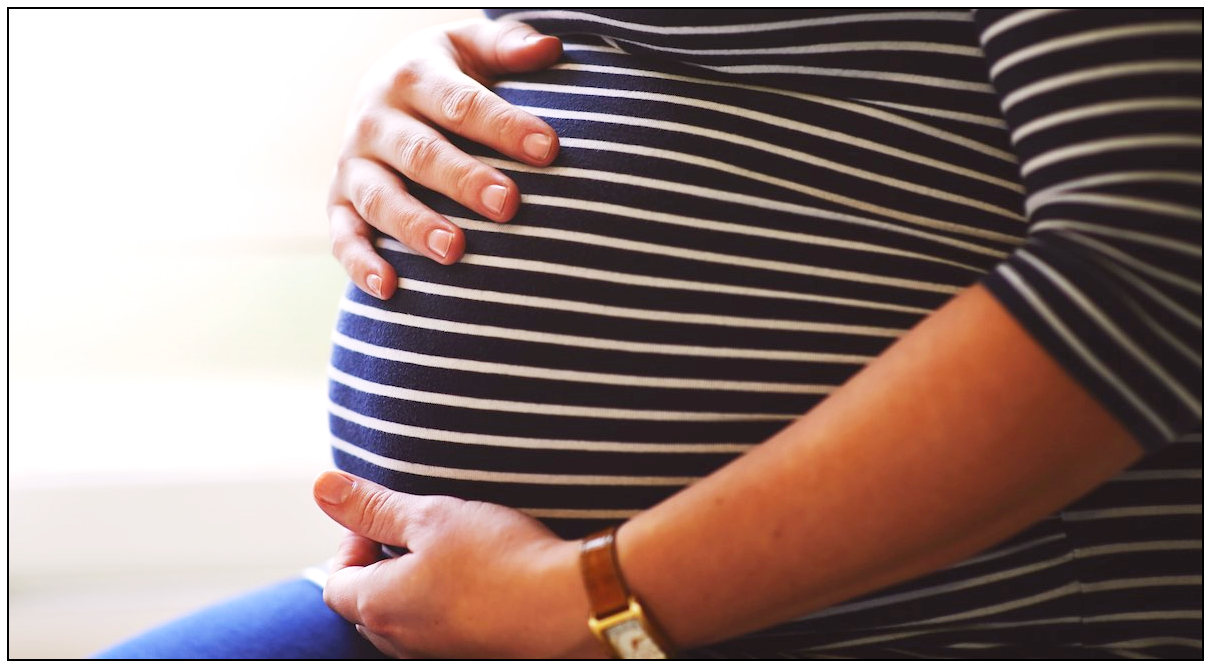 (30 Aug.) The 13th Amendment states that "Neither slavery nor involuntary servitude …. shall exist within the United States…." This language has led desperate abortion advocates to their latest justification of legalized abortion: that pregnancy is a form of involuntary servitude. This notion – that women could be involuntary servants to pregnancy – is not based on legal reality or sound thought.
(30 Aug.) The 13th Amendment states that "Neither slavery nor involuntary servitude …. shall exist within the United States…." This language has led desperate abortion advocates to their latest justification of legalized abortion: that pregnancy is a form of involuntary servitude. This notion – that women could be involuntary servants to pregnancy – is not based on legal reality or sound thought.
Involuntary servitude to a preborn child?
The idea – as discussed by Reproductive Health Matters – that a woman could be a slave or an involuntary servant to her embryo or fetus is illogical. A child, especially one as vulnerable as a fetus or embryo in the womb, has no power or authority over an adult in any way. He or she exists with no agenda, no plan to force anyone to do anything, and no ability to make a decision or issue a command. In fact, the only reason that a preborn child exists in 99.95% of pregnancies in the U.S. is because of the intentional act of consensual sex, which resulted in a predictable, reasonably foreseeable, natural biological outcome.
In other words, in most cases, the woman helped to create the human being by whom she claims she is being enslaved. But in reality, she could still legally kill that child in the United States. Her child is vulnerable to her decisions – which would be impossible if she were her child's involuntary servant.
Involuntary servitude to the government?
In an opinion essay for The New York Times, Michele Goodwin, chancellor's professor of law at the University of California, states, "Ending the forced sexual and reproductive servitude of Black girls and women was a critical part of the passage of the 13th and 14th Amendments. The overturning of Roe v. Wade reveals the Supreme Court's neglectful reading of the amendments that abolished slavery and guaranteed all people equal protection under the law." [read more...]
COMMENTARY: Some of the arguments that pro-abortionists come up with are as laughable as they are illogical! How can an unborn baby exercise any power or authority over the woman who helped create it? The only authority the baby can call upon is the right to life. When 99.5% of pregnancies are the result of consentual sex, how can they apply the 13th and 14th Amendments to consider this forced servitude?
WHAT DOES THE FUTURE HOLD FOR THE DISABLED WHEN EUTHANASIA IS LEGAL?
from: BioEdge.org
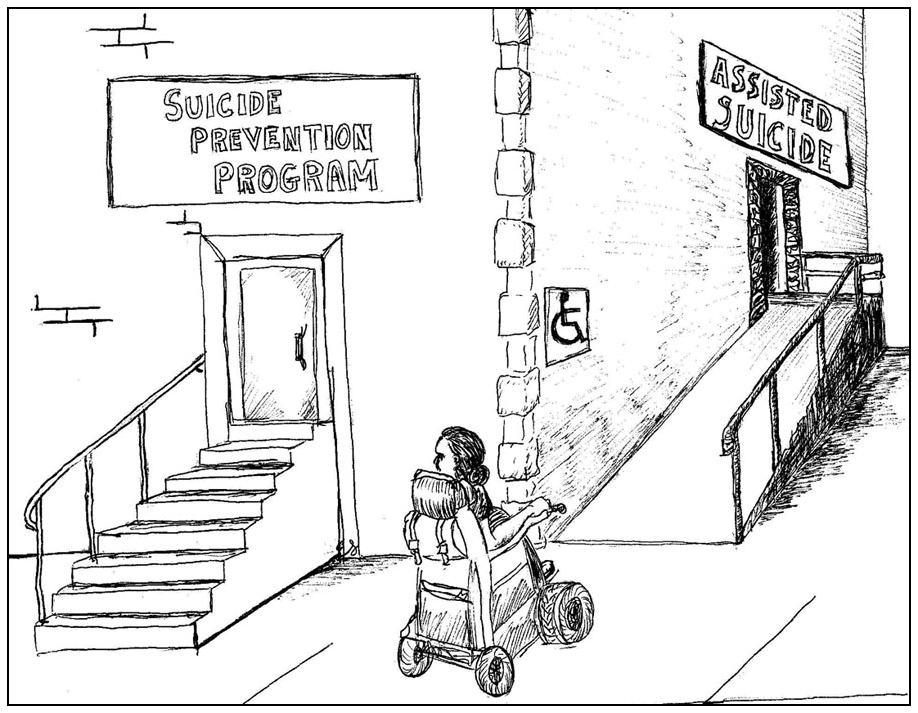 (6 Sep.) As the cartoon above by Amy Hasbrouck, a Board Member of "Not Dead Yet" in the US, suggests, disability activists fear that euthanasia could become a cheaper option for medical care. In a position paper published by the Anscombe Bioethics Centre, in the UK, a Canadian expert in disability studies contends that "While the expansion of [euthanasia and assisted suicide] has been motivated by a desire to end suffering and respect autonomy, in doing so we have created significant risk to disabled persons in a world which largely sees their lives as less valuable, as ones of inevitable suffering and as not worth living."
(6 Sep.) As the cartoon above by Amy Hasbrouck, a Board Member of "Not Dead Yet" in the US, suggests, disability activists fear that euthanasia could become a cheaper option for medical care. In a position paper published by the Anscombe Bioethics Centre, in the UK, a Canadian expert in disability studies contends that "While the expansion of [euthanasia and assisted suicide] has been motivated by a desire to end suffering and respect autonomy, in doing so we have created significant risk to disabled persons in a world which largely sees their lives as less valuable, as ones of inevitable suffering and as not worth living."
Professor Tim Stainton, director of the Canadian Institute for Inclusion and Citizenship, believes that a "quiet eugenics" becomes more acceptable when euthanasia and assisted suicide (EAS) have been legalised. In many countries, children with Down syndrome are already being aborted after pre-natal testing. In Belgium and the Netherlands, neo-natal euthanasia is technically illegal but permitted in some circumstance. Professor Stainton says that "Significant numbers of these cases involve neonates with non-life threatening, medically treatable conditions and disabilities."
He cites studies of the ableist attitudes in the medical profession. One recent survey found that 82% of practicing physicians in the US believed that "people with significant disability have worse quality of life than non-disabled people." This makes "unbiased practice of EAS with regards to disabled individuals … highly questionable," he writes.
Attitudes towards the disabled ignore what scholars called "the disability paradox" – that "many with persistent and serious disabilities report that they experience anywhere between a good to an excellent quality of life." But people with an ableist bias are unable to appreciate that. To return to the message of the cartoon, Professon Stainton writes that "A key concern of the disability community is that people will seek access to EAS because they are unable to secure the degree or types of disability supports and accommodations they need to live a full and meaningful life."
What does the future hold for the disabled in countries with EAS? Professor Stainton fears that broad public support for "mercy killings" will create a climate in which parents will be able to have disabled children euthanised. "It is also not inconceivable that families with decision-making control or influence will choose EAS for their children when faced with insurmountable barriers to securing appropriate supports." [source]
COMMENTARY: See also the BioEdge article "Death Without Dignity" on this topic. We must reverse this trend toward euthanasia and assisted suicide (EAS).
BELARUS: OFFICIALS THREATEN TO LIQUIDATE MINSK'S NEW LIFE CHURCH
from: Forum 18 News Service
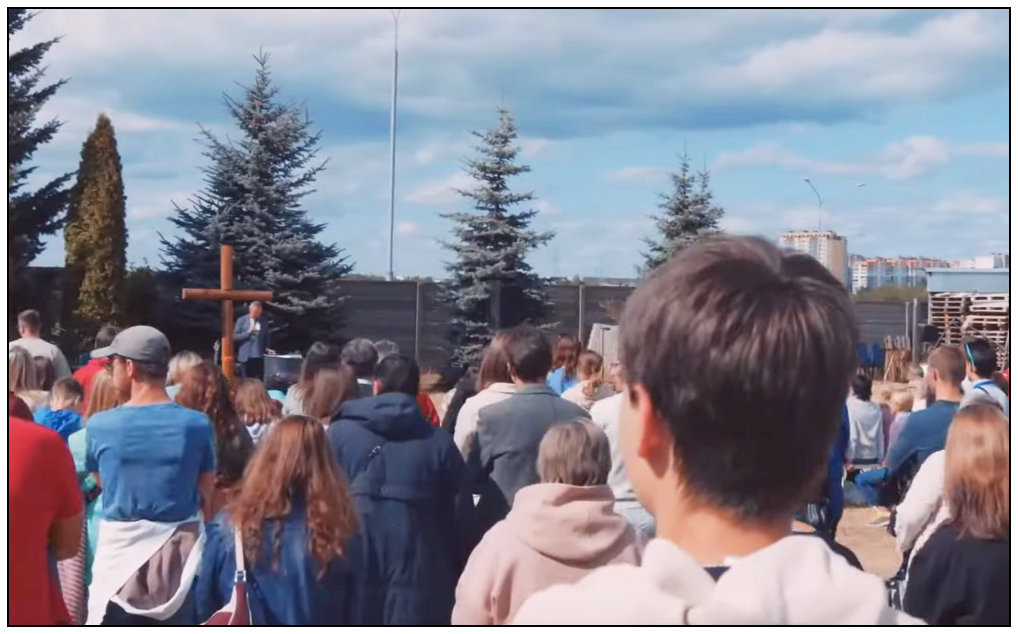 (7 Sep.) Minsk City Administration and local police have warned New Life Pentecostal Church that meetings for worship in the church car park are illegal and threatened to liquidate the Church in court. Liquidation would make any exercise of freedom of religion or belief illegal and punishable with up to a two-year jail term. The Church meets each Sunday in the car park after officials evicted it in February 2021 from the church building it bought in 2002. Officials refuse to explain why the Church cannot use its building.
(7 Sep.) Minsk City Administration and local police have warned New Life Pentecostal Church that meetings for worship in the church car park are illegal and threatened to liquidate the Church in court. Liquidation would make any exercise of freedom of religion or belief illegal and punishable with up to a two-year jail term. The Church meets each Sunday in the car park after officials evicted it in February 2021 from the church building it bought in 2002. Officials refuse to explain why the Church cannot use its building.
For more than 18 months, Minsk's New Life Pentecostal Church has met for worship each Sunday outdoors in the church car park, whatever the weather, since officials, police and bailiffs evicted it from its church building in February 2021. Now the city administration has again warned the Church that such meetings are illegal and threatened to seek the Church's liquidation in court. Liquidation would make any exercise of freedom of religion or belief illegal and subject to punishment.
Since January 2022, the newly-restored Article 193-1 of the Criminal Code once more punishes "organisation of or participation in activity by an unregistered political party, foundation, civil or religious organisation" with a fine or imprisonment for up to two years. The head of Minsk's Frunze District administration and the local head of Police repeatedly summoned the Church's Pastor, Vyacheslav Goncharenko, in August. Both officials again warned him against holding meetings at the car park and threatened to initiate the procedure to liquidate New Life Church through the court.
The Bishop of the Full Gospel Churches Union Leonid Voronenko initiated meetings with the city administration and with the regime's senior religious affairs official, Plenipotentiary for Religious and Ethnic Affairs Aleksandr Rumak. New Life Church – which was founded in 1992 – held its most recent Sunday service on 4 September, behind rather than in front of the church building. Like all its outdoor services, the Church live-streamed it on YouTube.
Forum 18 was unable to find out why the authorities will not allow New Life Church to use its own building again, offer another building or offer compensation. City, district and police officials could not be reached or would not answer questions. Asked why New Life Church's situation cannot be resolved given that officials themselves had evicted the community from its building, the Head of the Ideology Department of Minsk City Executive Committee, Olga Chemodanova, refused to comment. "Your question is posed incorrectly," she told Forum 18.
Asked whether he is afraid of the church liquidation as threatened, Pastor Goncharenko told Forum 18: "I think that our situation is not without God's miracle, as so many times the authorities came and threatened us, but our church is still functioning."
Meanwhile, police in the south-eastern city of Gomel summoned Living Faith Church Pastor Dmitri Podlobko and issued him with a second official warning, threatening him with possible criminal prosecution if he repeats the "offense" of conducting baptisms on his own property without permission. A court fined him two weeks' average wages for this in late July. He will also have to meet the local police officer each month for the next year for a "preventive" conversation [read more...]
COMMENTARY: Article 193-1 of the Belarus Criminal Code was repealed in 2018 but reinstated in January 2022. It is a method for the state to control NGOs (non-governmental organizations) by threatening to liquidate them or outright liquidating them. We have been reporting on the Belarus government's crackdown on this church for several years now.
FEDS SEEK TO REMOVE MEDICAID BARRIERS FOR THOSE WITH DISABILITIES
from: Disability Scoop
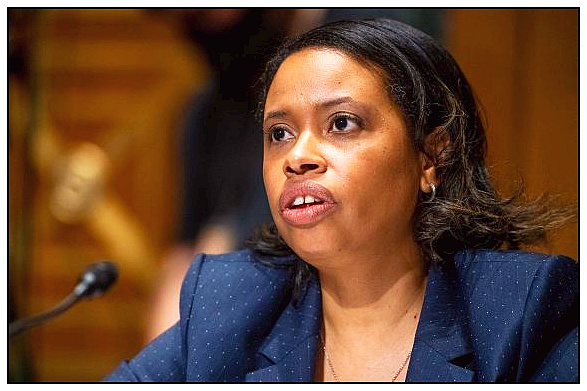 (6 Sep.) With a plan to overhaul the enrollment process, federal officials say they are taking steps to make it easier for people with disabilities to gain Medicaid coverage and keep it.
(6 Sep.) With a plan to overhaul the enrollment process, federal officials say they are taking steps to make it easier for people with disabilities to gain Medicaid coverage and keep it.
The Centers for Medicare and Medicaid Services is proposing a new rule designed to simplify the application and verification processes for people seeking coverage through Medicaid and the Children’s Health Insurance Program known as CHIP.
The regulation being published this week would standardize eligibility and enrollment for the programs, CMS officials said. Further, the rule would generally limit renewals to once a year, ensure that applicants have 30 days to respond to requests, create consistency in the renewal process across states and mandate that renewal forms be pre-populated.
The move is intended to help individuals with disabilities and those from other underserved communities who are eligible for Medicaid but are not enrolled or have difficulty remaining part of the program "because of systemic barriers," CMS said.
"This proposed rule will ensure that these individuals and families, often from underserved communities, can access the health care and coverage to which they are entitled — a foundational principle of health equity," CMS Administrator Chiquita Brooks-LaSure said.
The regulation would eliminate requirements for in-person interviews and impose a 90-day reconsideration period in cases where coverage is terminated because beneficiaries fail to return information needed to determine re-eligibility, among other changes. [read more...]
COMMENTARY: It's a good thing that the government is giving people with disabilites more time to complete applications and respond to questions that arise. Some people with disabilites do not have a full-time helper to assist them with government paperwork.
"WAR IN UKRAINE, PEACE AND JUSTICE IN THE EUROPEAN REGION": STATEMENT BY THE WCC 11TH ASSEMBLY IN KARLSRUHE, GERMANY
from: Religious Information Service of Ukraine
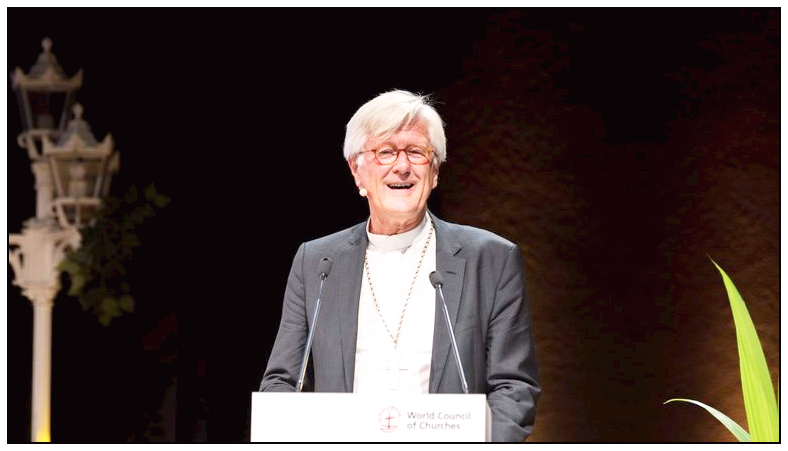 (9 Sep.) The 11th Assembly of the World Council of Churches (WCC) is meeting in Karlsruhe, Germany, under the theme “Christ’s love moves the world to reconciliation and unity”. The theme guides delegates and participants to take seriously the call for unity in Christ and to live as people of Christ’s reconciliation, with God and with one another.
(9 Sep.) The 11th Assembly of the World Council of Churches (WCC) is meeting in Karlsruhe, Germany, under the theme “Christ’s love moves the world to reconciliation and unity”. The theme guides delegates and participants to take seriously the call for unity in Christ and to live as people of Christ’s reconciliation, with God and with one another.
The war in Ukraine
As we meet in Karlsruhe, tragically, we are witnessing a war afflicting Europe. The thoughts and prayers of all participants in the 11th Assembly of the WCC are focused on the people and country of Ukraine, and the tragic consequences they have and are suffering since the Russian invasion on 24 February 2022, in addition to the thousands of casualties including many civilians in the East of the country and hundreds of thousands of refugees and displaced people since 2014.
During this six month period, there have been over 13,000 Ukrainian civilian casualties and cities such as Mariupol have been laid in ruins. At this moment close to 14 million people – almost one-third of the entire population of Ukraine – have been forced to flee their homes (according to UNHCR). Moreover, there are many reports of atrocities that may constitute war crimes and crimes against humanity, including sexual and gender-based violence, as well as greatly heightened vulnerability to human trafficking. In addition, we are very concerned about the risks of catastrophic consequences resulting from damage caused to the Zaporizhzhia nuclear power plant by military activities in its vicinity - as well as containment security at the site of the Chornobyl disaster of 1986.
At its meeting in June 2022, the WCC central committee deplored the war as “illegal and unjustifiable”, lamenting the awful and continuing toll of deaths, destruction and displacement, of destroyed relationships and ever more deeply entrenched antagonism between the people of the region, of escalating confrontation globally, of increased famine risk in food insecure regions of the world, of economic hardship and heightened social and political instability in many countries.
This Assembly strongly affirms the position expressed by the central committee, and denounces this illegal and unjustifiable war. As Christians from different parts of the world we renew the call for an immediate ceasefire to halt the death and destruction, and for dialogue and negotiations to secure a sustainable peace. We appeal to all sides in the conflict to respect the principles of international humanitarian law, including especially with regard to the protection of civilians and civilian infrastructure, and for the humane treatment of prisoners of war.
We also strongly affirm the central committee’s declaration that war is incompatible with God’s very nature and will for humanity and against our fundamental Christian and ecumenical principles, and accordingly reject any misuse of religious language and authority to justify armed aggression and hatred.
We urge all parties to withdraw and refrain from military action in the vicinity of the Zaporizhzhia nuclear power plant and other such locations that may risk unimaginable threats to current and future generations.
We join in praying for all the victims of this tragic conflict, in Ukraine, in the region and throughout the world, that their suffering may cease and that they may be consoled and restored to lives of safety and dignity, and we assure them of the love and accompaniment of the WCC global fellowship of churches. We commend the local churches, specialized ministries and all humanitarian organizations that are supporting the suffering people in all parts of Ukraine and beyond, and who are receiving and caring for refugees in full respect for their God-given human dignity fleeing from the war. [read more...]
COMMENTARY: This lead-in is just "the tip of the iceberg" from the article, only about 1/8th of it. Whether or not you are a fan of the WCC (I'm generally not, due to its tendency toward universalism), it is commendable that they are taking a firm, principled stand against Russia's aggression, atrocities, and destruction in Ukraine that began 8 years ago and only intensified 6 months ago. Thank you, WCC, for telling it like it is!
FROM ECUMENICAL PATRIARCH BARTHOLOMEW: "HOW CAN WE BLESS THIS WAR, AS KIRILL DOES?"
from: Orthodox Times
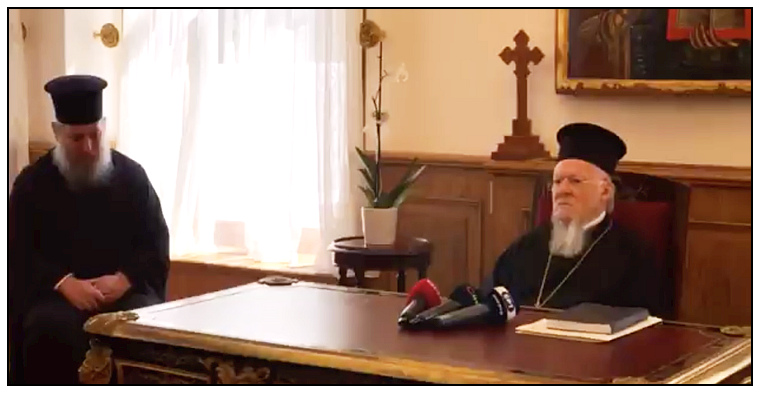 (29 Aug.) Ecumenical Patriarch Bartholomew once again expressed his condemnation of the war that began with the invasion of Ukraine by Russia. Speaking at a press conference on the conference of Orthodox youths in Turkey organized by the Ecumenical Patriarchate in early September, the Patriarch said that "I have expressed the position of the Ecumenical Patriarchate since the beginning of this painful war. I said that it is unjustified and unacceptable."
(29 Aug.) Ecumenical Patriarch Bartholomew once again expressed his condemnation of the war that began with the invasion of Ukraine by Russia. Speaking at a press conference on the conference of Orthodox youths in Turkey organized by the Ecumenical Patriarchate in early September, the Patriarch said that "I have expressed the position of the Ecumenical Patriarchate since the beginning of this painful war. I said that it is unjustified and unacceptable."
He continued: "His Beatitude the Patriarch of Moscow said that it was a holy war and tried to justify it and explain it in spiritual and religious terms. But I have allowed myself to correct it and say that it is not a holy war but an unholy and evil war. When thousands of new soldiers are killed on both sides, and not only soldiers but also civilians, how can we bless this war with our two hands, as the Blessed Patriarch of Moscow unfortunately does?"
He also stressed that Russia could choose another way to solve its problems with the Ukraine with which it borders. "He chose the worst way. We want this war to end an hour earlier, for the Western powers to help persuade Russia." At the beginning of his speech, referring to the conference, the Ecumenical Patriarch stated that the Ecumenical Patriarchate, as the Mother Church, always shows a strong interest in youth.
"We have Russians, Ukrainians, Gagauzians, Georgians, Romanians, and so on and we all surround them with the same affection without making any discrimination in favor of one or at the expense of the other. They are all children of the Patriarchate as long as they live here, in Turkey." He underlined that "according to the canonical law of the Orthodox Church, no other Church has jurisdiction over the Orthodox who live in Turkey, except the Ecumenical Patriarchate, as the local Church." [read more...]
COMMENTARY: See also the article "LATVIAN PRESIDENT SUBMITS BILL TO SEPARATE LATVIAN CHURCH FROM MOSCOW PATRIARCHATE" from the OthoChristian website. Latvian President Egils Levits stated that the bill will "restore the historical status of the Latvian Orthodox Church," arguing that independence was granted by Patriarch St. Tikhon in 1921. (You might want to filter out the tone of the article because "OthoChristian" is a pro-Moscow outlet.)
NOW, OUR VIEWS:
THE COMING DEMISE OF RUSSIAN AUTOCRACY AND PATRIARCHY?
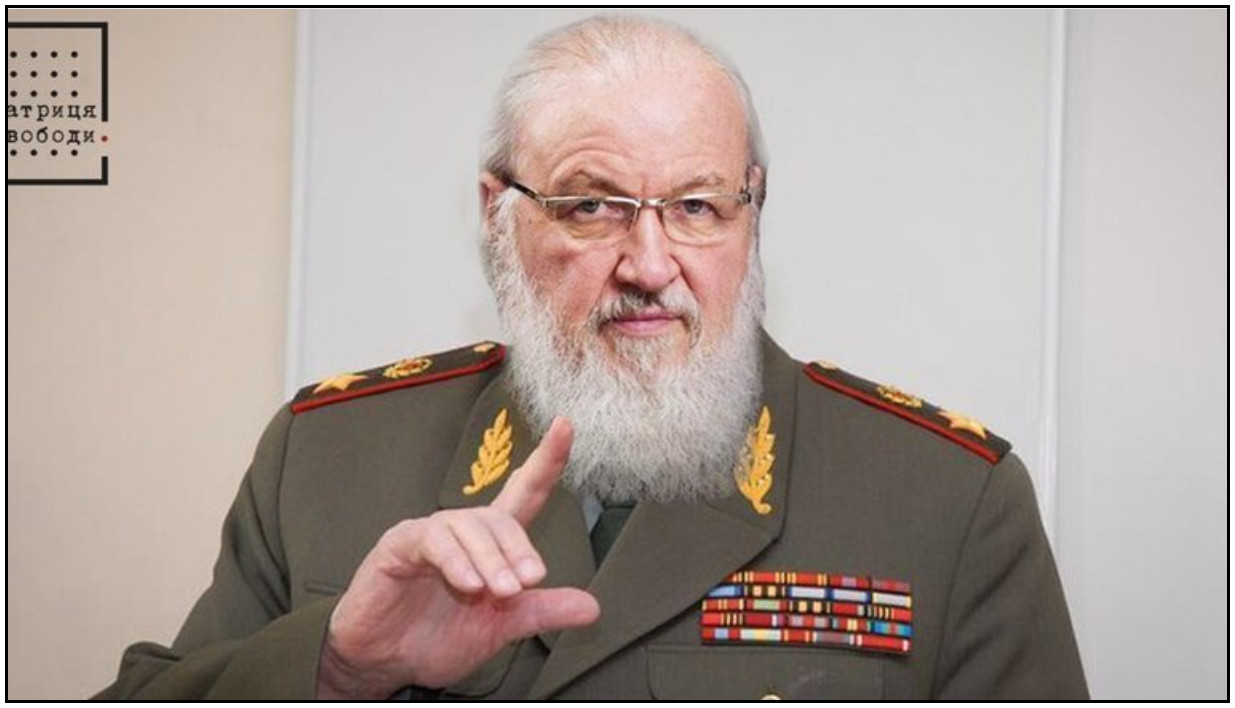 See MSN's very recent article "Kirill, the Patriarch of the Russian Orthodox Church who considers Putin to be a 'miracle'" with a fascinating slide show depicting him as a strong supporter of Putin and the Russian military, lending all the splendor and regal robes of his patriarchal position to the support of Putin's war in Ukraine.
See MSN's very recent article "Kirill, the Patriarch of the Russian Orthodox Church who considers Putin to be a 'miracle'" with a fascinating slide show depicting him as a strong supporter of Putin and the Russian military, lending all the splendor and regal robes of his patriarchal position to the support of Putin's war in Ukraine.
As I write this, Ukrainian armed forces are pushing Russian forces out of Kharkiv in the east as well as advancing toward Kherson in the south, as despirited Russian soldiers have lost both the will and the supplies with which to fight. If Ukraine were to retake Kherson, it would threaten to cut off Russia's "land bridge" to Crimea. Ukraine's new missiles are already destroying military bases and command centers in Crimea. If and when Ukraine drives the Russian forces completely out of Ukraine, what will become of Kirill's prestige and power, not to mention Putin's? Already, some "Russian Officials Propose Overthrowing Putin, Charging Him With Treason" per Newsweek magazine.
While we were living in Moscow and I was leading the project to revise the Russian Bible in the early 2000s, one of our Russian coworkers was a young man who worked in then-Metropolitan Kirill's office of the Russian Orthodox Church's external relations department. He was working with us ostensibly because Kirill's office couldn't afford to pay him a regular salary. At about the same time, I had been invited as a representative of an American publishing ministry to a meeting with Russian Orthodox bishops... who, as these bishops drove up each in their black Mercedes sedan, said that the other Western guests were given a special half-price rate for rooms at the Russian Patriarch's hotel: "only" $200 per night, not $400: what a bargain! But they didn't have enough money to pay my Russian coworker. (At the time, foreigners could find a decent hotel room in Moscow for under $50 a night including breakfast, and we were renting a Russian apartment for about $200 a month.)
This young man told me one time that he reported about me to the Russian FSB (the successor to the Soviet's KGB), saying that I was no threat to Russia. He also claimed that I of course reported to U.S. intelligence agencies, which I denied, saying that it was illegal for American religious workers to also work for or report to U.S. intelligence agencies. So I am personally aware of the fact that Kirill's office cooperates with the Russian intelligence services.
How and why could it ever happen that such a "Devil's bargain" could occur between church and state in Russia? Kievan Rus adopted Orthodox Christianity in 988 A.D. (My wife and I drove to Chicago in 1988 to celebrate the "Millenium of Russian Christianity" at a Ukrainian Orthodox cathedral there: now the Ukrainian Orthodox in the U.S. and Canada are strongly opposed to Russia.) To understand this issue, let me explain a bit of history: in the 10th through 15th centuries, Kyiv was the center of Orthodox Christianity, eventually having the largest number of Orthodox followers anywhere.
But by the end of the 16th century, as the article "HOW THE RUSSIAN CHURCH BECAME PATRIARCHAL" explains on page 2, "Then, in January, 1589 Patriarch Jeremiah and Tsar Theodore Ivanovich
presided over a 'Holy Synod of the Great Russian Empire and of the Greek Empire' which sanctioned the creation of an autocephalous Russian
patriarchate."
To clarify this rather lengthy obfuscation, I woud add a clarification: "In actual fact, Patriarch Jeremiah was imprisoned by the Ottomans and the Muscovites, and was forced to elevate the see of Moscow to a patriarchy [Studylight.org]." Feel free to research this on your own: Fr. Thomas Hopko, in one of his Ancient Faith Radio podcasts, years ago tipped me off about this by saying that the Russians had virtually kidnapped the Ecumenical Patriarch and were holding him hostage until he agreed to make Moscow a Patriarchate and the center of Slavic Orthodoxy. So there you have it: the Moscow church supplanted Kyiv's and has been in bed with the semi-pagan state for over 500 years, since the time of Tsar Ivan the Terrible.
(Get this as a separate article on our ARC-News blog at blogspot.com and share it!)
Last Sunday evening, after feeling wiped out for 2 days, I self-tested positive for Covid. As I write this, I'm 6 days from testing positive and am feeling just about normal. But my wife Cheryl tested positive Wednesday morning and still feels wiped out. So please pray for our speedy and full recovery. Thanks! And today we mark our 56th wedding anniversary, but we've decided to postpone our celebration until next weekend when we should have fully recovered.
 Where does the concept of "philanthropy" come from? Where did we get the idea of erecting hospitals, orphanages, homes for the elderly and infirm? Today we might think that these institutions were created by billionaires who made their money off railroads, steel mills or the stock market, or perhaps the government dreamed them up. But the historical fact is that these institutions for the public well-being were created during the one-thousand-year-long Byzantine Christian Empire. Only later did these ideas take root in Western Europe, and from there to the rest of the world.
Where does the concept of "philanthropy" come from? Where did we get the idea of erecting hospitals, orphanages, homes for the elderly and infirm? Today we might think that these institutions were created by billionaires who made their money off railroads, steel mills or the stock market, or perhaps the government dreamed them up. But the historical fact is that these institutions for the public well-being were created during the one-thousand-year-long Byzantine Christian Empire. Only later did these ideas take root in Western Europe, and from there to the rest of the world.
 (30 Aug.) The 13th Amendment states that "Neither slavery nor involuntary servitude …. shall exist within the United States…." This language has led desperate abortion advocates to their latest justification of legalized abortion: that pregnancy is a form of involuntary servitude. This notion – that women could be involuntary servants to pregnancy – is not based on legal reality or sound thought.
(30 Aug.) The 13th Amendment states that "Neither slavery nor involuntary servitude …. shall exist within the United States…." This language has led desperate abortion advocates to their latest justification of legalized abortion: that pregnancy is a form of involuntary servitude. This notion – that women could be involuntary servants to pregnancy – is not based on legal reality or sound thought. (6 Sep.) As the cartoon above by Amy Hasbrouck, a Board Member of "Not Dead Yet" in the US, suggests, disability activists fear that euthanasia could become a cheaper option for medical care. In a position paper published by the Anscombe Bioethics Centre, in the UK, a Canadian expert in disability studies contends that "While the expansion of [euthanasia and assisted suicide] has been motivated by a desire to end suffering and respect autonomy, in doing so we have created significant risk to disabled persons in a world which largely sees their lives as less valuable, as ones of inevitable suffering and as not worth living."
(6 Sep.) As the cartoon above by Amy Hasbrouck, a Board Member of "Not Dead Yet" in the US, suggests, disability activists fear that euthanasia could become a cheaper option for medical care. In a position paper published by the Anscombe Bioethics Centre, in the UK, a Canadian expert in disability studies contends that "While the expansion of [euthanasia and assisted suicide] has been motivated by a desire to end suffering and respect autonomy, in doing so we have created significant risk to disabled persons in a world which largely sees their lives as less valuable, as ones of inevitable suffering and as not worth living." (7 Sep.) Minsk City Administration and local police have warned New Life Pentecostal Church that meetings for worship in the church car park are illegal and threatened to liquidate the Church in court. Liquidation would make any exercise of freedom of religion or belief illegal and punishable with up to a two-year jail term. The Church meets each Sunday in the car park after officials evicted it in February 2021 from the church building it bought in 2002. Officials refuse to explain why the Church cannot use its building.
(7 Sep.) Minsk City Administration and local police have warned New Life Pentecostal Church that meetings for worship in the church car park are illegal and threatened to liquidate the Church in court. Liquidation would make any exercise of freedom of religion or belief illegal and punishable with up to a two-year jail term. The Church meets each Sunday in the car park after officials evicted it in February 2021 from the church building it bought in 2002. Officials refuse to explain why the Church cannot use its building. (6 Sep.) With a plan to overhaul the enrollment process, federal officials say they are taking steps to make it easier for people with disabilities to gain Medicaid coverage and keep it.
(6 Sep.) With a plan to overhaul the enrollment process, federal officials say they are taking steps to make it easier for people with disabilities to gain Medicaid coverage and keep it. (9 Sep.) The 11th Assembly of the World Council of Churches (WCC) is meeting in Karlsruhe, Germany, under the theme “Christ’s love moves the world to reconciliation and unity”. The theme guides delegates and participants to take seriously the call for unity in Christ and to live as people of Christ’s reconciliation, with God and with one another.
(9 Sep.) The 11th Assembly of the World Council of Churches (WCC) is meeting in Karlsruhe, Germany, under the theme “Christ’s love moves the world to reconciliation and unity”. The theme guides delegates and participants to take seriously the call for unity in Christ and to live as people of Christ’s reconciliation, with God and with one another. (29 Aug.) Ecumenical Patriarch Bartholomew once again expressed his condemnation of the war that began with the invasion of Ukraine by Russia. Speaking at a press conference on the conference of Orthodox youths in Turkey organized by the Ecumenical Patriarchate in early September, the Patriarch said that "I have expressed the position of the Ecumenical Patriarchate since the beginning of this painful war. I said that it is unjustified and unacceptable."
(29 Aug.) Ecumenical Patriarch Bartholomew once again expressed his condemnation of the war that began with the invasion of Ukraine by Russia. Speaking at a press conference on the conference of Orthodox youths in Turkey organized by the Ecumenical Patriarchate in early September, the Patriarch said that "I have expressed the position of the Ecumenical Patriarchate since the beginning of this painful war. I said that it is unjustified and unacceptable."
